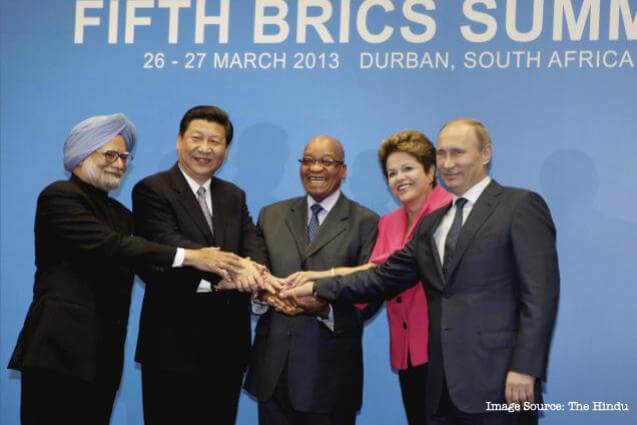There was a lot of attention on the 5th BRICS summit, from 26-27 March 2013, hosted this time bySouth Africa inDurban. For one, it was the first summit in the African continent of the five (Brazil,Russia,India,China andSouth Africa) big emerging powers with some ten African heads of states also invited to the BRICS-Africa Dialogue Forum.
There was also the expectation that the meeting would launch the much anticipated New Development Bank (NDB) as a counter to the World Bank. The 2012 Delhi summit had mandated BRICS finance ministers to examine the feasibility and viability of a new bank and report back in a year at Durban.
The Ministers did duly report back, but the detail was lacking [1]. The report is also not public, as yet. The short statement on the Bank mentioned that following the report from the Finance Ministers, the leaders were satisfied that the NDB is feasible and viable.
The next steps would involve arriving at the capital contributions (the figures for the start up finance range from $ 50-100 billion), structure, location and key focus areas. Reports indicate that the process will take at least a couple of years before the NDB, which is expected to focus on infrastructure and sustainable development, is up and ready to roll out funds.
While there has been some rhetoric on the NDB being a counter to the World Bank, it is unlikely that, unless there is pressure from below, this will happen.
The World Bank also focuses on infrastructure and sustainable development projects. So, given the mix of top-down state developmentalism and neoliberalism that is being implemented in much of the BRICS countries, chances are that the NDB will end up being complementary to the World Bank (WB) and other regional banks such as the Asian Development Bank (ADB), Inter American Developmental Bank (IADB) and African Development Bank (AfDB).
The challenge really is that of democratisation. Can groups that have worked on development finance and debunked the ideology and projects of the Bretton Woods Institutions and its regional lackeys in Africa, Asia and Latin America come together to force Governments to ensure that the NDB is a progressive and people centered funding mechanism?
BRICS leaders have already stated that that the NDB will not have conditionalities on privatisation, deregulation and macro-economic policy, all hallmarks of the discredited ‘Washington Consensus’ of the International Monetary Fund (IMF) and WB.
But that is not enough. In countries such as India, privatisation and deregulation has already happened and the problem is not so much with WB or ADB conditionalities or funding. It is that development financing (much of it now domestic) is being channelled into financing a state led neo-liberal development model with massive power projects, mining, ports and undemocratic infrastructure schemes such as the $90 billion Delhi Mumbai Industrial Corridor (DMIC).
In terms of what a progressive southern led development bank should look like there is much to be learnt from the principles and process of setting up the Bancosur (Bank of the South) that was launched by the late Venezuelan President Hugo Chavez.
The idea behind Bancosur is that it will not focus on infrastructure but on projects that have the potential to develop poorer areas, preserving the environment and on projects that aim at closing the poverty gap. Another lesser known forum the IBSA (India Brazil South Africa) Triangular Forum also offers lessons to the NDB. Since 2004, the IBSA fund has supported projects such as HIV and AIDS treatment centres in Burundi, agriculture, education and clean energy development inGuinea-Bissau.
The work ahead on the BRICS bank is the challenge of articulating a new tri-continental internationalism – one that will bring together social movements, trade unions and civil society groups from Africa, Asia and Latin America to articulate development policies, programmes and projects that are formulated through open, transparent, publicly accountable and democratic consultative processes, and serve the needs and aspirations of all, especially disadvantaged and vulnerable populations ( in other words ‘democratic industrialisation’).
Legislators and Parliamentarians will also have to be involved as part of this initiative. This will have to happen at the national, regional and international level and that work needs to begin now. Or the historical opportunity of influencing the NDB to be a bank of the south, with its raison d’etre of an autonomous people centered financing, will be lost.
******************************************************************************
[1] Statement by BRICS Leaders on the establishment of the New Development Bank, Fifth BRICS Summit, Ethekwini available at http://www.thepresidency.gov.za/pebble.asp?relid=15128
(You can contact the author at – benny.kuruvilla@actionaid.org)
 Author: Benny Kuruvilla
Author: Benny Kuruvilla




